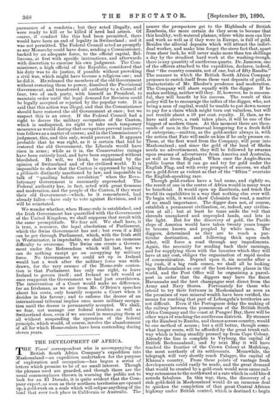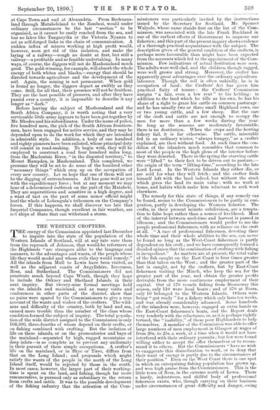THE DEVELOPMENT OF AFRICA. T HE Times' correspondent who is accompanying
the British South Africa Company's expedition into Mashonaland—an expedition undertaken for the purpose of exploration and occupation—has begun a series of letters which promise to be of no small interest. Though the phrases used are guarded, and though there are the usual commonplaces thrown in warning the public not to look for an El Dorado, it is quite evident that the Com- pany expect, as soon as their northern territories are opened up, a gold-rush on a scale which will eclipse anything of the kind that ever took place in California or Australia. The nearer the prospectors get to the Highlands of British Zambesia, the more certain do they seem to become that this healthy, well-watered plateau, where white men can live and work as well as if they were in Europe, is full of gold. Besides the alluvial deposits which will attract the indivi- dual worker, and make him forget the stern fact that, apart from sheer luck, he will never make more than ten shillings a day by the steadiest hard work at the washing-trough, there is any quantity of auriferous quartz. Dr. Jameson, one of the officers attached to the expedition, declares, indeed, that "the country consists, not of one, but of fifty Randts." The manner in which the British South Africa Company proposes to enrich itself from these vast deposits of gold, is characteristic of Mr. Rhodes's prudence and moderation.
The Company will share equally with the digger. If he makes nothing, neither will they. If, however, he is success- ful, they will benefit by his success. The result of this policy will be to encourage the influx of the digger, who, not being a man of capital, would be unable to put down money to pay for a claim which might turn out valueless, but will not trouble about a 50 per cent, royalty. If, then, as we have said above, a rush takes place, it will be one of the biggest of modern times. At this moment there are thou- sands of men in the Transvaal hungering for a fresh field of enterprise,—smitten, as the gold-seeker always is, with the notion that Fate will smile on him if he only presses on. These, at the first word from the Company, will pour into Mashonaland; and since the gold of the land of Sheba needs no advertisement, they will be followed by swarms upon swarms of adventurers from America and Australia, as well as from England. When once the Anglo-Saxon public learns that it can go and try for gold under the English Flag. and with every prospect of success, we shall see a gold-fever as violent as that of the "fifties" overtake the English-speaking race.
Though gold-rushes have a bad name, and rightly so, the result of one in the centre of Africa would in many ways be beneficial. It would open up Zambesia, and teach the world its capabilities in a way that nothing else ever will. To begin with, it would show Colonists the road, a matter of no small importance. The digger does not, of course, establish a permanent civilisation, or, indeed, any civilisa- tion at all ; but at least he tears aside the veil that shrouds unexplored and unpeopled lands, and lets in the light. But for the discovery of gold, the Pacific slope of America would have taken twenty years longer to become known and peopled by white men. The diggers, determined as they are to reach a par- ticular destination, and following thick upon each other, will force a road through any impediments. Again, the necessity for sending back their earnings, and for supplying them with the luxuries which they will have at any cost, obliges the organisation of rapid modes of communication. Depend upon it, six months after a big rush, if a big rush comes, we shall all be looking upon Mashonaland as one of the best-known places in the world, and the Post Office will be • organising a parcel- post in order that the diggers may have the finest Havannahs and the best champagne sent direct from the Army and Navy Stores. Fortunately for those who intend to try their fortunes in Mashonaland as soon as the promises of vast mineral wealth have been verified, the means for reaching that part of Lobengula's territories are not difficult. Even if the Portuguese delay the making of the railway between the possessions of the British South Africa Company and the coast at Pungwi Bay, there will be other ways of reaching the auriferous districts. By steamer up the Zambesi to Zumbo, and thence across country, would be one method of access ; but a still better, though some- what longer route, will be afforded by the great trunk rail- way which is being steadily pressed up from Cape Colony. Already the line is complete to Vryburg, the capital of British Bechuanaland; and by next May it will have reached the frontier of the Crown Colony at Mafeking, the most northerly of its settlements. Meanwhile, the telegraph will very shortly reach Palapye, the capital of Khama's country. From these points of vantage fresh developments could easily be made, and the great demand that would be created by a gold-rush would soon cause rail- way extensions to the northward at a rate which in cold bloc d sounds fabulous. In this way, then, the discovery of a rich gold-field in Mashonaland would do an immense deal to quicken the completion of that great Central African highway under British control, which is destined t) begin at Cape Town and end at Alexandria. From Bechuana- land through Matabeleland to the Zambesi, would under ordinary circumstances be the last " section " to be organised, as it cannot be easily reached from the sea, and has no lakes like Tanganyika or the Victoria Nyanza to act as self-forged links in the chain of communication. A sudden influx of miners working at high profit would, however, soon get rid of this isolation, and make the laying of a railway—rough no doubt at first, but still a railway—a profitable and so feasible undertaking. In many ways, of course, the diggers will not do Mashonaland much good. The gold-winning, for example, will absorb the whole energy of both whites and blacks,—energy that should be directed towards agriculture and the development of the soil. Again, the mining is not permanent. When gold is found no longer, the diggers depart as swiftly as they come. Still, for all that, their presence will not be fruitless. They are the best possible of pioneers, and after they have passed over a country, it is impossible to describe it any longer as "dark." Before leaving the subject of Mashonaland and the South Africa Company, it is worth noting that a very serviceable little army appears to have been got together by Mr. Rhodes and his subordinates. Under the name of police, five hundred men, the pick of the South African frontiers- men, have been engaged for active service, and they may be depended upon to do the work for which they are intended in admirable style. In addition, a body of one hundred and eighty pioneers have been enlisted, whose principal duty will consist in road-making. To begin with, they will be employed to construct a road four hundred miles long, from the Macloutsie River, "in the disputed territory," to Mount Hampden, in Mashonaland. This completed, we presume they will be set to do some of the hundred other "necessary things" which crop up on the occupation of every new country. Let us hope that one of them will not be the digging of entrenchments. All has gone well as yet with the expeditionary force ; but at any moment we may hear of a determined outbreak on the part of the Matabele. They are superstitious and sensitive in a high degree, and a want of tact on the part of some minor official might hurl the whole of Lobengula's tribesmen on the Company's forces. If this happens, we shall discover too late that Imperial Companies, though excellent in fair weather, are net ships of State that can withstand a storm.



































 Previous page
Previous page